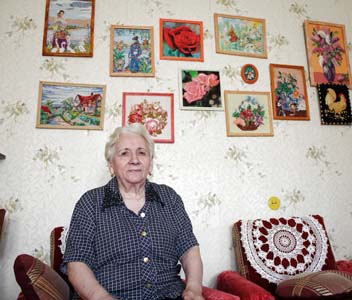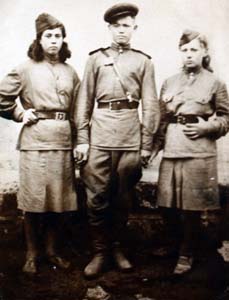

Project «Voices of Jewish settlements. Vitebsk region.»פיתוח קשרי התרבות בין העמים של ישראל ובלרוס
|
|---|
Website search |
|
MainNew publicationsContactsSite mapVitebsk regionMogilev regionMinsk regionMikhail Rivkin, Arkady Shulman
|
Memories of Yelena Nikolayevna Zibert:I experienced the war, lived in a ghetto, which took my family. I was sent to Germany by fascists… My life after the war was not easy, I know what betrayal is. I have had a long life and the fact that I can quickly forget bad people, helps me go on with life. Yelena Nikolayevna Zibert.
Yelena Nikolayevna Zibert.
All of my grandparents and great-grandparents are from Vitebsk. I was born here in 1930. I do not originate from a rich family. Mother – Dora Mordukhovna Drozdnik – worked as a waitress in a restaurant, she was Jewish. My father, Nicolai Chukmazov, was Russian. They got divorced when I was small and mother married Isaak Khvainson. My uncle, Abram Mordukhovich Drozdnik, was a military man. When the war started, my stepfather was left to work here. He died when Germans invaded. My uncle Abram came to us and said: “Dora, you must leave.” She was against but he literally forced her. We did not take anything, not even documents or clothes. We got on a train and were approaching Rudnia when the train broke down. We were surrounded by moss and water. Then Germans started bombing. We nearly sank but managed to flee. We had some distant relatives in Rudnia and it turned out they were planning to leave. They had a big family. We only asked them to take my two-year-old brother Vovochka and grandmother, who was ill. They loaded their clothes onto a horse carriage but refused to take us… We walked day and night. Every time we were being bombed I ran trying to hide and then mother had to look for me. Our neighbor told her: “Dora, your girl looks Russian. Someone can give her shelter and she will survive.” But she refused to leave me. In the end, we reached Smolensk, which already had a ghetto. The neighborhood was called Yamshina and before the war had been populated by both Russians and Jews. Russians were then evicted and the place was settled by Jews only. It was so overcrowded. We stayed in a tiny room – five families, all with children. I went begging for food every day. We were not allowed to leave the ghetto – a policeman was guarding the entrance. But children made a hole in the wall and could go out unnoticed. I was usually accompanied by another girl, Frida. She was two years older than me. So we would leave through the hole in order to find food for our families. We went begging in a place where German trains with the wounded stopped. Some of them gave us food, others said: “Get out of here, you Russian pig!” We had yellow circles attached to our clothes showing we were Jewish. We took the jackets off and begged for bread, potatoes or potato peels. Sometimes we went to a slaughter house and collected what was left from animals. Then I got typhus and I am still wondering how I survived. I remember I lay on the floor. I am also surprised no one else got it from me. An old couple lived together with us in the room. Their son was working in Smolensk; he had a Russian wife and a child. Someone reported on him and he was taken to Gestapo. His wife came to us and said: “Dora, I need your girl. I want to find out about my husband and would like to leave the child with her. I promise to bring her back tomorrow.” Mother was reluctant but agreed. It was my destiny… She took me and we walked fifteen kilometers away from Smolensk. In the morning we were sitting outside. The weather was really nice and warm. That was when an old man approached us and said: “Come here. Have you heard the news? All the Jews in Smolensk were murdered today.” Later a woman from Smolensk narrated to me that the people had been pushed into mobile gas-chambers and then the dead bodies were unloaded into a ditch. I was stunned: I left the child and ran to Smolensk crying all the way. I entered the ghetto through the secret hole. The place was empty. I only noticed a policeman standing on a bridge. It was a railway bridge. I ran towards our house hoping to see my mother, brother and grandmother – everything looked deserted. The policeman on the bridge stopped me and I told him I was Jewish and my mother had been killed. “Where have you been all this time? – he asked. “In a village.” “Go back to the village”, - he let me go. I met some Russian people who knew I was Jewish and that I had been in the ghetto. The woman told me: “Come stay with me for a while and then I will find you someone who has children.” She found me a woman who had two baby girls. Her husband was at the battlefront. I looked after the girls. I think her name was Vera, she was around thirty. Then, it was like a fairy tale, she met that policeman that I had met on the bridge. I could not believe that. I have no idea where she met him. The man was from Siberia. They got married, in a church. When he came to the house he recognized me and did not utter a word. He did not treat me badly, she did. When he was drunk he protected me, when sober – did not interfere. I stayed there for a long time. Then some Smolensk policemen were sent to Minsk and he moved there with the family, too. They did not leave me behind - I followed. She continued treating me badly, though.  Yelena Zibert (to the right).
Yelena Zibert (to the right).1945 г. - Did she know you were Jewish? - Certainly she did. I realized I needed to leave, but where? One day I went to the Komarovsky market and met a girl I had known in Smolensk. She sold saccharin. She got married during the war to a man who lived in Borisov and came to Minsk from Borisov to sell saccharin at the market. She noticed me. She was around twenty. I told her my story. She said that I needed to get a permit to leave Misnk and then come live with them in Borisov. The permit had to be issued by Germans. A fat ugly German asked me what I wanted and I replied that my family had been killed and that I had a sister in Borisov. I told him I needed the permit. In return he slapped me on the face and said: “Get out, pig!” That girl managed to get me the permit by bribing someone and took me to Borisov. I stayed with her for a long time. - Did she know who you were? - Sure. One day we, together with her husband, were caught by Nazis at the market and taken to a train, which had originally been used for transporting cattle. We were sent to Germany and placed in a barracks with other captives. - When asked “Who are you?” what did you answer? - I said I was Russian. It was a rather big concentration camp a hundred kilometers away from Grauden. We mopped the floors, cleaned the territory of the camp and did other work. I was sent to Germany at the beginning of 1943 and stayed there until 1945 when we were liberated by the Soviet Army. Then every day all of us were interrogated by Soviet officers, even the children. After that we were brought to Warsaw and dressed in military clothes. I still have a photograph… I was then sent to Grodno region to work. There I met a Ukrainian girl who wrote a letter to her brother, officer, and let him know that children were not allowed to go back to their homes. Only then they let us go. - When did you return to Vitebsk? - I came back in December, 1945. I came back, even though my parents were no longer there and our house had been destroyed. I could not go begging anymore and wandered around the city hungry. Soon I was given a job at a factory and worked there for 21 years. This is my story. I was saved by a miracle. I got married and have a daughter, a son and grandchildren. Yelena Zibert’s videointerview |
|||
|
|
Jewish settlements in Vitebsk regionVitebsk • Albrehtovo • Babinovichi • Baran • Bayevo • Begoml • Beshenkovichi • Bocheikovo • Bogushevsk • Borkovichi • Braslav • Bychiha • Chashniki • Disna • Dobromysli • Dokshitsy • Druya • Dubrovno • Glubokoye • Gorodok • Kamen • Kohanovo • Kolyshki • Kopys • Krasnopolie • Kublichi • Lepel • Liady • Liozno • Lukoml • Luzhki • Lyntupy • Miory • Obol • Oboltsy • Orsha • Osintorf • Ostrovno • Parafianovo • Plissa • Polotsk • Prozorki • Senno • Sharkovshina • Shumilino • Sirotino • Slaveni• Smolyany • Surazh • Tolochin • Ulla • Verhnedvinsk • Vidzy • Volyntsy • Yanovichi • Yezerishe • Zhary • Ziabki • |
Main |
New publications |
Contacts |
Site map |
Vitebsk region |
Mogilev region |
Minsk region |